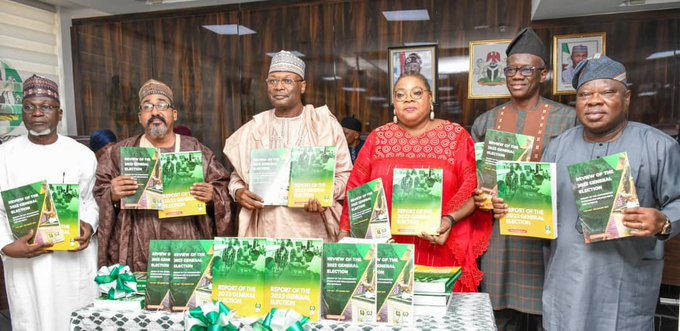The INEC Chairman, National Commissioners and Resident Electoral Commissioners discussed the 142 recommendations from the 2023 election review, focusing on early/special voting, diaspora voting, and the unbundling of the commission, with a legal review of eight recommendations for legislative action by the National Assembly and a presentation to the Joint Committee of the Senate and House of Representatives on Electoral Matters.
The meeting on Thursday considered the 142 recommendations arising from its review of the 2023 General Election which include early/special voting for the millions of Nigerians who do not vote at the moment on account of the roles they play during elections, diaspora voting, the unbundling of the Commission with the establishment of electoral offences tribunal and a separate agency to handle the registration and regulation of political parties.
Specifically, INEC management would soon be having a legal review of eight recommendations that require legislative action by the National Assembly. “Very soon, the Commission will make a presentation to the Joint Committee of the Senate and House of Representatives on Electoral Matters as they continue to deliberate on electoral reform”, Prof. Yakubu informed the RECs during their last consultative meeting for the year.
According to him, out of the 142 recommendations, 86 require administrative action by the Commission while 48 recommendations require action by a variety of stakeholders, including security agencies, mobile network operators, statutory bodies, political parties, transport unions, civil society organisations and the media.
He said: “Among the major highlights of the Commission’s recommendations is the imperative of legal clarity in result management, about manual transfer versus the electronic transmission of results.
“The Commission also believes that with the introduction of the Bimodal Voter Accreditation System (BVAS), the use of the Permanent Voters’ Cards (PVC) as the sole means of identification for voter accreditation on Election Day should be reviewed. Those who already have the PVCs can still use them to vote, but in the future, computer-generated slips issued to the voter or even downloaded from the Commission’s website will suffice for voter accreditation.
This will not only save cost, it will also eliminate the issues around the collection of PVCs and the diabolical practice of buying up the cards from voters in order to disenfranchise them”, he said.
“As a matter of urgency, the Commission also intends to develop protocols for the cleaning up of the voters’ register in collaboration with other agencies such as the National Identity Management Commission (NIMC) and the National Population Commission (NPC).
“Other areas of reform include advocacy for affirmative action for greater participation of under-represented groups, a more robust voter education and public communication to combat fake news and misinformation”, he stressed.


More Stories
Alumni Treasure and National Transformation
The “Sins” of Fubara Leading to A State of Emergency by Attorney General
Blackout Due to Line Tripping, Not Grid Collapse, Says TCN